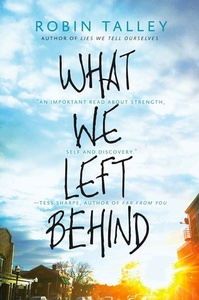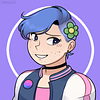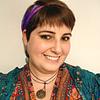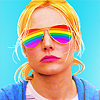Take a photo of a barcode or cover
2017 review
Après avoir découvert le premier roman YA de Robin Talley j'avais très envie de découvrir ses autres œuvres du même genre, dont WHAT WE LEFT BEHIND. Ici l'auteure aborde la découverte de soi et la vie de couple à distance, tout en explorant encore une fois la communauté LGBTQIA; on suit Tony et Gretchen, qui s'aiment depuis deux ans déjà, mais partent dans deux universités différentes, dans des villes différentes. Étant toujours à la recherche de roman reflétant la diversité de notre monde, j'étais ravi de commencer WHAT WE LEFT BEHIND, mais j'ai été malheureusement déçue en de nombreux point.
Pour commencer, bien que j'aime beaucoup les histoires romantiques, la rencontre de Tony et Gretchen m'a vraiment perturbé. Tony et Gretchen se voient pour la première fois et c'est le coup de foudre instantané qui part pour 2 ans de relations de couple. Aucune discussion vraiment sérieuse n'a lieu entre les deux et hop voilà un nouveau couple au lycée. En plus de ce point, j'ai trouvé que l'intrigue était très vide. Certes on a Tony qui recherche son identité ainsi que la question de la durabilité du couple, mais à part ça c'est très creux.
Ensuite, au début lorsque Tony s'identifie comme genderqueer, Tony n'utilise pas de pronom. Aucun. D'après Tony, la langue anglaise (et langue en générale) accorde trop d'importance au genre; dans un sens je comprends les intentions du personnage, et c'est d'ailleurs un aspect très intéressant évoqué dans le livre. Là où ça coince, c'est que Tony n'utilise de pronom pour personne, ni même pour ses amis ou autres, ce qui d'après moi pose un gros problème de respect envers ses amis qui ont pour certains à se battre pour être appelés par le pronom avec lequel ils sont à l'aise (Andy notamment fait une remarque très pertinente à ce sujet). Encore une fois, lorsque Tony décide d'utiliser they/them ou ze/hir en tant que pronoms, aucun respect au pronoms de ses amis n'est fait.
J'ai été très heureuse et surprise par la diversité du roman, il y a plusieurs afro-américain ainsi qu'un coréen et un vietnamien dans l'entourage direct de Tony, ça ne paraît pas beaucoup mais c'est plus que la plupart des romans. En revanche j'ai eu un gros problème en ce qui concerne les personnages cis blanc et hétéro, pour commencer ils n'y en a presque pas, ce qui est compréhensible vu le thème du roman, mais les seuls présents sont juste infectes! Prenons Felicia et Joanna, les colocs de Tony, dès le départ Tony décide de ne pas s'y intéresser, disant carrément dans ses propos que sa présence dans leur chambre apporte de la diversité et de l'originalité. Dans ce genre de propos, j'avais l'impression que Tony voyait le genre, la sexualité et l'ethnicité comme des accessoires de modes démarquant les gens entre eux, ce qui n'est absolument pas le cas. Le livre donne d'après moi l'impression que la communauté LBGT+ voue une haine aux hétéro, ce qui est totalement faux; Grectchen dit par exemple qu'être hétéro est trop conventionnel et qu'elle ne voudrait pas qu'on pense qu'elle l'était.
Pour en revenir à Felicia et Joanna, elles sont même critiqués jusque dans leur manière de s'habiller, Tony dit en effet qu'elles "ne peuvent pas parler de féminisme alors qu'elles prennent des photos d'elles en bikini". En aucun cas le port du bikini ou tout autre comportement similaire est anti-féministe, c'est donc un propos qui m'a révoltée. Enfin, le mellieur ami de Gretchen, Caroll, m'a dégoutée. Il a des propos totalement transphobe et abject, et Gretchen ne le corrige presque jamais malgré qu'elle n'adhère pas à ses propos ce qui m'a insupporté.
Pour finir, je n'ai pas aimé le fait que les labels de genderqueer et gender variant soient utilisés comme des sortes de phases jusqu'à être trans. Ce ne sont pas des phases, certes certaines personnes peuvent changer le "label" auquel ils s'identifient plusieurs fois, mais ce sont des identités au même niveau que cis et trans. J'ai lu une interview de Robin Talley disant qu'elle avait fait des recherches et discuté avec les membres d'une communauté ainsi que ses amis pour rendre son roman authentique et vrai, mais je pense que ce travail n'a pas été assez approfondi. Ici j'ai principalement cité les points négatifs, mais le roman reste très intéressant et bien écrit. J’apprécie le fait que l'auteure ai souhaité aborder ce sujet qui n'est pas assez traité et j'espère que beaucoup d'autres livres traiteront de cela.
Après avoir découvert le premier roman YA de Robin Talley j'avais très envie de découvrir ses autres œuvres du même genre, dont WHAT WE LEFT BEHIND. Ici l'auteure aborde la découverte de soi et la vie de couple à distance, tout en explorant encore une fois la communauté LGBTQIA; on suit Tony et Gretchen, qui s'aiment depuis deux ans déjà, mais partent dans deux universités différentes, dans des villes différentes. Étant toujours à la recherche de roman reflétant la diversité de notre monde, j'étais ravi de commencer WHAT WE LEFT BEHIND, mais j'ai été malheureusement déçue en de nombreux point.
Pour commencer, bien que j'aime beaucoup les histoires romantiques, la rencontre de Tony et Gretchen m'a vraiment perturbé. Tony et Gretchen se voient pour la première fois et c'est le coup de foudre instantané qui part pour 2 ans de relations de couple. Aucune discussion vraiment sérieuse n'a lieu entre les deux et hop voilà un nouveau couple au lycée. En plus de ce point, j'ai trouvé que l'intrigue était très vide. Certes on a Tony qui recherche son identité ainsi que la question de la durabilité du couple, mais à part ça c'est très creux.
Ensuite, au début lorsque Tony s'identifie comme genderqueer, Tony n'utilise pas de pronom. Aucun. D'après Tony, la langue anglaise (et langue en générale) accorde trop d'importance au genre; dans un sens je comprends les intentions du personnage, et c'est d'ailleurs un aspect très intéressant évoqué dans le livre. Là où ça coince, c'est que Tony n'utilise de pronom pour personne, ni même pour ses amis ou autres, ce qui d'après moi pose un gros problème de respect envers ses amis qui ont pour certains à se battre pour être appelés par le pronom avec lequel ils sont à l'aise (Andy notamment fait une remarque très pertinente à ce sujet). Encore une fois, lorsque Tony décide d'utiliser they/them ou ze/hir en tant que pronoms, aucun respect au pronoms de ses amis n'est fait.
J'ai été très heureuse et surprise par la diversité du roman, il y a plusieurs afro-américain ainsi qu'un coréen et un vietnamien dans l'entourage direct de Tony, ça ne paraît pas beaucoup mais c'est plus que la plupart des romans. En revanche j'ai eu un gros problème en ce qui concerne les personnages cis blanc et hétéro, pour commencer ils n'y en a presque pas, ce qui est compréhensible vu le thème du roman, mais les seuls présents sont juste infectes! Prenons Felicia et Joanna, les colocs de Tony, dès le départ Tony décide de ne pas s'y intéresser, disant carrément dans ses propos que sa présence dans leur chambre apporte de la diversité et de l'originalité. Dans ce genre de propos, j'avais l'impression que Tony voyait le genre, la sexualité et l'ethnicité comme des accessoires de modes démarquant les gens entre eux, ce qui n'est absolument pas le cas. Le livre donne d'après moi l'impression que la communauté LBGT+ voue une haine aux hétéro, ce qui est totalement faux; Grectchen dit par exemple qu'être hétéro est trop conventionnel et qu'elle ne voudrait pas qu'on pense qu'elle l'était.
Pour en revenir à Felicia et Joanna, elles sont même critiqués jusque dans leur manière de s'habiller, Tony dit en effet qu'elles "ne peuvent pas parler de féminisme alors qu'elles prennent des photos d'elles en bikini". En aucun cas le port du bikini ou tout autre comportement similaire est anti-féministe, c'est donc un propos qui m'a révoltée. Enfin, le mellieur ami de Gretchen, Caroll, m'a dégoutée. Il a des propos totalement transphobe et abject, et Gretchen ne le corrige presque jamais malgré qu'elle n'adhère pas à ses propos ce qui m'a insupporté.
Pour finir, je n'ai pas aimé le fait que les labels de genderqueer et gender variant soient utilisés comme des sortes de phases jusqu'à être trans. Ce ne sont pas des phases, certes certaines personnes peuvent changer le "label" auquel ils s'identifient plusieurs fois, mais ce sont des identités au même niveau que cis et trans. J'ai lu une interview de Robin Talley disant qu'elle avait fait des recherches et discuté avec les membres d'une communauté ainsi que ses amis pour rendre son roman authentique et vrai, mais je pense que ce travail n'a pas été assez approfondi. Ici j'ai principalement cité les points négatifs, mais le roman reste très intéressant et bien écrit. J’apprécie le fait que l'auteure ai souhaité aborder ce sujet qui n'est pas assez traité et j'espère que beaucoup d'autres livres traiteront de cela.
I appreciate what this book was trying to do, but it just didn’t do it.
After loving Robin Talley's Lies We Tell Ourselves, I was really excited to read this book and I think that is why I found it so disappointing. It wasn't a bad book but it was merely average at best. There wasn't much of a plot at all beyond the two main characters Gretchen and Toni leaving High School and going to College - nothing else of note happens in the entire book - it is all about the characters themselves and their development. Which would have been fine if the characters had depth to them, but sadly most of them did not. Gretchen was okay but Toni was unlikable and had nothing about her other than her overwhelming confusion about her gender and sexuality. At first she was interesting but after a while she just felt whiney rather than anything else and I disliked the way Genderqueer was made to sound like an interim term for people deciding whether or not they are transgender - in my personal experience it is not that at all. I could go on about things that bugged me but I have already gone over my 100 word limit, so I won't. What We Left Behind had plenty of potential to be an interesting and informative book but it fell short of the mark somewhere and left me feeling like I'd read a book on cardboard cut-out characters of varying gender and sexual orientations with no depth to the story or the people.
A heart-breaking but important story of first love and self-discovery from one of my favourite new young adult authors. What We Left Behind follows perfect couple Toni and Gretchen as they attempt a long-distance relationship during their first year of college. But as Toni, who identifies as genderqueer, begins to consider transitioning from female to male, the cracks in their relationship begin to grow.
What We Left Behind is a difficult book to read and enjoy, because it’s not a happy book. I remember all too well how difficult that first year of university can be, but Toni and Gretchen’s problems far exceeded mine. The reader knows going in that What We Left Behind is a break-up book, not a typical love story, but it’s still a little depressing to watch Toni and Gretchen slowly fall out of the close relationship they used to share. That said, I soldiered through the book and I’m glad I did; every single reservation I had about What We Left Behind - from the cheesy insta-love connection between Toni and Gretchen, to their communication issues, to their major character flaws - was discussed and dealt with by the end of the novel. The actual break-up scene, which I was expecting to be the lowest point for Toni and Gretchen in the novel, was actually a wonderfully empowering and uplifting moment for both of them.
Both Toni and Gretchen are flawed and occasionally unlikable - Toni is judgemental, while Gretchen is overly dependent, and both make mistakes with life-changing consequences. Both characters were so flawed that I did find it difficult at times to sympathise with them; however, it was satisfying to see them acknowledge their flaws to themselves and grow as individuals, with and without each other.
A lot of reviewers have expressed their discomfort with Toni’s identification as genderqueer, given that it suggests to readers unfamiliar with the term genderqueer that it’s a transitional phase for people like Toni, who are confused as to where they fit into the gender spectrum, rather than an actual and valid gender identity. I didn’t feel that was the case; if anything, I found Toni’s transgender friends’ dismissive treatment of Toni’s identification as genderqueer (and their determination from the moment they met Toni to see Toni as a trans man who still hadn’t come to terms with their identity) much more problematic than Toni’s use of the term. Toni, on the other hand, repeatedly reminds the reader that they’re not entirely comfortable with the label genderqueer, as it doesn’t truly fit Toni. Like other readers, I would have liked Toni’s friends to be more accepting of Toni’s identification as genderqueer, but just as Toni and Gretchen are presented as fallible and occasionally unlikable, so are Toni’s friends, and I don’t necessarily think Talley meant for the reader to agree with their assessment of Toni’s gender identity.
If you like complex, diverse characters and bittersweet love stories, I recommend giving this book a try. Many thanks to Mira Ink for providing a copy of What We Left Behind in exchange for an honest review. What We Left Behind will be published on October 22nd in the U.K., and October 27th in the U.S.
Publisher: Mira Ink/Harlequin Teen
Rating: 4 stars | ★★★★✰
Review cross-posted to Paperback'd
What We Left Behind is a difficult book to read and enjoy, because it’s not a happy book. I remember all too well how difficult that first year of university can be, but Toni and Gretchen’s problems far exceeded mine. The reader knows going in that What We Left Behind is a break-up book, not a typical love story, but it’s still a little depressing to watch Toni and Gretchen slowly fall out of the close relationship they used to share. That said, I soldiered through the book and I’m glad I did; every single reservation I had about What We Left Behind - from the cheesy insta-love connection between Toni and Gretchen, to their communication issues, to their major character flaws - was discussed and dealt with by the end of the novel. The actual break-up scene, which I was expecting to be the lowest point for Toni and Gretchen in the novel, was actually a wonderfully empowering and uplifting moment for both of them.
Both Toni and Gretchen are flawed and occasionally unlikable - Toni is judgemental, while Gretchen is overly dependent, and both make mistakes with life-changing consequences. Both characters were so flawed that I did find it difficult at times to sympathise with them; however, it was satisfying to see them acknowledge their flaws to themselves and grow as individuals, with and without each other.
A lot of reviewers have expressed their discomfort with Toni’s identification as genderqueer, given that it suggests to readers unfamiliar with the term genderqueer that it’s a transitional phase for people like Toni, who are confused as to where they fit into the gender spectrum, rather than an actual and valid gender identity. I didn’t feel that was the case; if anything, I found Toni’s transgender friends’ dismissive treatment of Toni’s identification as genderqueer (and their determination from the moment they met Toni to see Toni as a trans man who still hadn’t come to terms with their identity) much more problematic than Toni’s use of the term. Toni, on the other hand, repeatedly reminds the reader that they’re not entirely comfortable with the label genderqueer, as it doesn’t truly fit Toni. Like other readers, I would have liked Toni’s friends to be more accepting of Toni’s identification as genderqueer, but just as Toni and Gretchen are presented as fallible and occasionally unlikable, so are Toni’s friends, and I don’t necessarily think Talley meant for the reader to agree with their assessment of Toni’s gender identity.
If you like complex, diverse characters and bittersweet love stories, I recommend giving this book a try. Many thanks to Mira Ink for providing a copy of What We Left Behind in exchange for an honest review. What We Left Behind will be published on October 22nd in the U.K., and October 27th in the U.S.
Publisher: Mira Ink/Harlequin Teen
Rating: 4 stars | ★★★★✰
Review cross-posted to Paperback'd
"What We Left Behind" is hard to review. It is like trying to review someone's diary. While I understand why this book is important, all the internal dialogue made the story drag for me. There were times when it was hard to empathize with the characters because we had so much detail on why they were making decisions. Their behavior was realistic to how I remember being in college, maybe I am just too old to really appreciate this book. ;)
DNF at a little over 20%, skipped ahead and read the last 5% or so. you can take this review with a little bit of a grain of salt then, but i had to rate it.
SPOILER ALERT: THE LESBIAN SLEEPS WITH A (CIS) GUY. (what a betrayal to have this come from a lesbian author writing for TEENAGERS. honestly. gross.)
it may have come in the parts i didn't read, but there seems to be very little regard for any identity issues a lesbian character who starts off with having a girlfriend who then becomes gender-neutral genderqueer and then becomes a "he." also, the genderqueer character T steadfastly refuses to use pronouns (even after being told by other trans people that this hurts, apparently, though i didn't make it to that part) but is perfectly fine with labeling people "guy" or "girl" on first sight?
SPOILER ALERT: THE LESBIAN SLEEPS WITH A (CIS) GUY. (what a betrayal to have this come from a lesbian author writing for TEENAGERS. honestly. gross.)
it may have come in the parts i didn't read, but there seems to be very little regard for any identity issues a lesbian character who starts off with having a girlfriend who then becomes gender-neutral genderqueer and then becomes a "he." also, the genderqueer character T steadfastly refuses to use pronouns (even after being told by other trans people that this hurts, apparently, though i didn't make it to that part) but is perfectly fine with labeling people "guy" or "girl" on first sight?
The fate of happy high school couples as they head off to college is well-known. Usually it's not a happy ending for the couple. But this sad outcome does provide a lot of plot.
This happy couple also has complicating factors due to genderqueer processing. The book does a great job of exploring the many wedges that are driven between a couple as they head off to college, plus it might be handy to read for older people who are curious about these young people and their discussions of pronouns and gender exploration. It's also from 2016, so some things might be out of date.
This happy couple also has complicating factors due to genderqueer processing. The book does a great job of exploring the many wedges that are driven between a couple as they head off to college, plus it might be handy to read for older people who are curious about these young people and their discussions of pronouns and gender exploration. It's also from 2016, so some things might be out of date.
Hahahahaha I am SO glad to be finished with this book.
I loved Talley's first book. Lies We Tell Ourselves had a few issues in terms of race representation, but I was able to get past most of those and focus on the story and be swept up in it and then get too emotionally involved and have a mini breakdown. It was fine. I was fine with it. But What We Left Behind rubbed me the wrong way the entire time I read it.
I am cisgender and have always identified that way, so I cannot entirely speak for how genderqueer people were represented in this book. However, I can say that Talley did with genderqueer people what a lot of authors do with bisexuals: making it seem like this identity is just a transition period to another identity. That's incorrect and horrible. These identities are not a phase, and acting as such is damaging, because this kind of representation gives people (people who don't understand, or don't want to understand, any kind of fluidity) the impression that these things are just a phase and shouldn't be taken seriously and are just a stepping stone. I understand that identity can be confusing, but Toni's struggle throughout the book made it seem as if being genderqueer meant being confused and judgmental all the time before finally "deciding" to be trans (which, again, is damaging because it came off like Toni was making a choice in this, which is not. how. it. works.).
And then (and this is going to be a rant), And then Gretchen was the only character I even remotely liked (except for Audrey, Toni's sister), and even she was intolerable of the time because she was too much of a Hufflepuff for me to stand. Stop being so nice. You're allowed to be selfish. You're allowed to fucking take care of yourself. You'll do better for other people if you fucking take care of yourself first (also she smiled way too much) (stop SMILING ffs). (Also, come the fuck on, if your new gay bff is supposed to be fashionable, because he's a stereotype, there's no goddamn way he would let you out of the house in CROCS.)
Plus, everyone in this book was so judgmental. Toni lives in a suite with three other girls, and insults two of them all the time for being very feminine and enjoying expensive things.
Joanna gets up at six in the morning to start a ninety-minute hair care regimen, and Felicia wears designer high heels every day even though they always get caught in the sidewalks. Joanna and Felicia are the ultimate gender conformists. Neither of them has the right to talk about feminism until they stop posting pictures of themselves in bikinis.
Ha yes because feminists obviously cannot post pictures of themselves in bikinis! Heaven forbid we show off our bodies because we're confident and proud! And heaven forbid we enjoy wearing high heels! I went to school in Boston, too, you asshole, and sometimes you wear heels even though the sidewalks are made of bricks BECAUSE YOU JUST WANT TO WEAR HIGH HEELS. It all came off as hating on anyone who observed mainstream binary gender practices, which is so hypocritical. If you don't want someone judging you for how you identify, you sure as hell do not get to criticize how anyone else practices or performs their gender identity.
And the way that race was discussed rubbed me the wrong way. I can't even pinpoint everything, but it was so incredibly irritating and felt so fake and wrong. It felt like most of this book was trying to be inclusive and teach people about things, but half of it came off as preachy and the other half was just plain fucking frustrating and wrong.
I loved Talley's first book. Lies We Tell Ourselves had a few issues in terms of race representation, but I was able to get past most of those and focus on the story and be swept up in it and then get too emotionally involved and have a mini breakdown. It was fine. I was fine with it. But What We Left Behind rubbed me the wrong way the entire time I read it.
I am cisgender and have always identified that way, so I cannot entirely speak for how genderqueer people were represented in this book. However, I can say that Talley did with genderqueer people what a lot of authors do with bisexuals: making it seem like this identity is just a transition period to another identity. That's incorrect and horrible. These identities are not a phase, and acting as such is damaging, because this kind of representation gives people (people who don't understand, or don't want to understand, any kind of fluidity) the impression that these things are just a phase and shouldn't be taken seriously and are just a stepping stone. I understand that identity can be confusing, but Toni's struggle throughout the book made it seem as if being genderqueer meant being confused and judgmental all the time before finally "deciding" to be trans (which, again, is damaging because it came off like Toni was making a choice in this, which is not. how. it. works.).
And then (and this is going to be a rant),
Spoiler
Gretchen, Toni's girlfriend, is upset and drunk one night and sleeps with her only friend at NYU, who is a gay guy. That's what immediately pushed my rating to two stars, because I'm sick of this story. First of all, the guy she sleeps with is rude and judgmental and all around awful, but we're supposed to feel sorry for him because he's gay and is having trouble coming out. Yes, dealing with that sucks, but no, that does not give you the right be a judgmental asshole. Would any of the things he said be forgivable if he had been a straight guy? No. But cis gay men are so high up on the LGBTQIA hierarchy that people just let them say whatever the hell they want and get away with it. Second of all, I'm so sick of the lesbian-sleeps-with-a-guy trope. SO fucking sick of it. Do some lesbians sleep with men before they come out, or while they're figuring themselves out? Of course. But not all of us do. And it seems like the former happens a lot more often in media than the latter, which is incredibly damaging because people think that all lesbians are interested in sleeping with men. Not true. We don't all get drunk or confused or freaked out and sleep with guys, and we need to see some more lesbians who do only sleep with women.Plus, everyone in this book was so judgmental. Toni lives in a suite with three other girls, and insults two of them all the time for being very feminine and enjoying expensive things.
Joanna gets up at six in the morning to start a ninety-minute hair care regimen, and Felicia wears designer high heels every day even though they always get caught in the sidewalks. Joanna and Felicia are the ultimate gender conformists. Neither of them has the right to talk about feminism until they stop posting pictures of themselves in bikinis.
Ha yes because feminists obviously cannot post pictures of themselves in bikinis! Heaven forbid we show off our bodies because we're confident and proud! And heaven forbid we enjoy wearing high heels! I went to school in Boston, too, you asshole, and sometimes you wear heels even though the sidewalks are made of bricks BECAUSE YOU JUST WANT TO WEAR HIGH HEELS. It all came off as hating on anyone who observed mainstream binary gender practices, which is so hypocritical. If you don't want someone judging you for how you identify, you sure as hell do not get to criticize how anyone else practices or performs their gender identity.
And the way that race was discussed rubbed me the wrong way. I can't even pinpoint everything, but it was so incredibly irritating and felt so fake and wrong. It felt like most of this book was trying to be inclusive and teach people about things, but half of it came off as preachy and the other half was just plain fucking frustrating and wrong.
Low 3 stars | books like this one are SO important, but the (almost obsessive) emphasis on labels really put me off :/




